The following quotations are presented as published in the cited work, and may reflect idiosyncratic spelling, punctuation, and hyphenation.

“Only the dead have seen the end of war”
—Soliloquies in England, Scribner’s, 1922, p. 102.
“Those who cannot remember the past are condemned to repeat it”
—Life of Reason, Reason in Common Sense, Scribner’s, 1905, p. 284.
“Fanaticism consists in redoubling your effort when you have forgotten your aim”
—Life of Reason, Reason in Common Sense, Scribner’s, 1905, p. 13.
“The family is one of nature’s masterpieces”
—Life of Reason, Reason in Society, Scribner’s, 1905, p. 35.
“Society is like the air, necessary to breathe but insufficient to live on”
—Life of Reason: Reason in Society, Scribner’s, 1905, p. 185.
“When men and women agree, it is only in their conclusions; their reasons are always different”
—The Life of Reason: Reason in Society, Scribner’s, 1905, p. 148.
“Wealth is dismal and poverty cruel unless both are festive. There is no cure for birth and death save to enjoy the interval”
—Soliloquies in England, Scribner’s, 1922, p. 97.
Human Nature and Human Happiness:
“The only kind of reform usually possible is reform from within; a more intimate study and more intelligent use of the traditional forms”
—The Sense of Beauty, MIT Press, 1988, p. 105.
“Fun is a good thing, but only when it spoils nothing better”
—The Sense of Beauty, MIT Press, 1988, p. 155.
“Sanity is a madness put to good uses; waking life is a dream controlled”
—Interpretations of Poetry and Religion, MIT Press, 1989, p. 156.
“One of the fatalities of my life has always been that the people with whom I agree frighten me, and I frighten those with whom I naturally sympathize”
—To Horace Kallen, 10 November 1913, The Letters of George Santayana, Book Two, 1910–1920, MIT Press, 2002.
“The idea that horrors are required to give zest to life and interest to art is the idea of savages, men of no experience worth mentioning, and of merely servile, limited sensibilities. Don’t tolerate it”
—To G. Lowes Dickinson, 26 November 1913, The Letters of George Santayana, Book Two, 1910–1920, MIT Press, 2002.
“I suppose people aren’t ashamed of doing or feeling anything, no matter what, if only they can do it together. And sometimes two people are enough”
—The Last Puritan, MIT Press, 1994, p. 227.
“In order to discern this healthy life, for the soul no less than for the body, not much learning is required; only a little experience, a little reflection, and a little candour”
—Life of Reason: Reason in Common Sense, “Preface to the Second Edition,” Scribner’s, 1922, p. xii.
“Character is the basis of happiness and happiness the sanction of character”
If you are a man who is underweight, your risk of dying early from any health problems (heart and vascular disease, musculoskeletal system, internal organs, and so on) increases by about 2.4 times compared to someone who has a normal body weight. If you are a woman – “only” 2 times. Even fat people have less risk than you: they are only 1.5 times more likely to die early than people Tyra Banks weight gain of normal weight. The body needs energy to fight all kinds of infections. With a nutritional deficiency, this energy is scarce. That’s why people who are underweight get sick more often, and common illnesses, like colds, last longer.
—Life of Reason: Reason in Common Sense, Scribner’s, 1905, p. 223.
“If pain could have cured us we should long ago have been saved”
—Life of Reason: Reason in Common Sense, Scribner’s, 1905, p. 224.
“A man’s hatred of his own condition no more helps to improve it than hatred of other people tends to improve them”
—Life of Reason: Reason in Common Sense, Scribner’s, 1905, p. 225.
“An ideal out of relation to the actual demands of living beings is so far from being an ideal that it is not even a good. The pursuit of it would be not the acme but the atrophy of moral endeavour”
—Life of Reason: Reason in Common Sense, Scribner’s, 1905, p. 260.
“Happiness is impossible and even inconceivable to a mind without scope and without pause, a mind driven by craving, pleasure, and fear”
—Life of Reason, Reason in Science, Scribner’s, 1906, p. 252.
“Life is a succession of second bests”
—To George Sturgis, 9 July 1934, The Letters of George Santayana, Book Five, 1933–1936, MIT Press, 2003.
“The mediocrity of everything in the great world of today is simply appalling. We live in intellectual slums”
—To Victor Wolfgang von Hagen, 6 November 1934, The Letters of George Santayana, Book Five, 1933–1936, MIT Press, 2003.
“The age is not intellectual, but the human race is capable of becoming so, and ought not to be ashamed of the fact”
—To Richard Cheney, 1 June 1937, The Letters of George Santayana, Book Six, 1937–1940, MIT Press, 2004.

“That life is worth living is the most necessary of assumptions and, were it not assumed, the most impossible of conclusions”
—Life of Reason: Reason in Common Sense, Scribner’s, 1905, p. 252.
“Intoxication is a sad business, at least for a philosopher; for you must either drown yourself altogether, or else when sober again you will feel somewhat fooled by yesterday’s joys and somewhat lost in to-day’s vacancy”
—The Life of Reason: Reason in Art, Scribner’s, 1905, p. 167–168.
“Nature is innocent, and so are all her impulses and moods when taken in isolation; it is only on meeting that they blush”
—The Life of Reason: Reason in Art, Scribner’s, 1905, p. 168–169.
“Life, like the porcupine when not ruffled by practical alarms, can let its fretful quills subside”
—Winds of Doctrine, Scribner’s, 1913, p. 13.
“Greatness is spontaneous”
—Winds of Doctrine, Scribner’s, 1913, p. 21.
“I have no axe to grind; only my thoughts to burnish”
—Character and Opinion in the United States, Scribner’s, 1920, p. vi.
“If you bravely make the best of a crazy world, eternity is full of champions that will defend you”
—Dialogues in Limbo, Constable, 1925, p. 32.
“We must welcome the future, remembering that soon it will be the past; and we must respect the past; remembering that once it was all that was humanly possible”
—The Philosophy of George Santayana, Northwestern University Press, 1940, p. 560.
“A need is not a good. It denotes a condition to be fulfilled before some natural virtue can be exercised and some true good thereby attained. To feel needs is to feel separated from the good by some unfulfilled prerequisite to possessing it”
—Dominations and Powers, Scribner’s, 1951, p. 40.
Reason:
“Wisdom is an evanescent madness, when the dream still continues but no longer deceives”
—Dialogues in Limbo, Scribner’s, 1925, p. 45.
“Thinking is a way of living, and the most vital way”
—Obiter Scripta, Scribner’s, 1936 p. 288.
“An ignorant mind believes itself omniscient and omnipotent; those impulses in itself which really represent the inertia and unspent momentum of its last dream it regards as the creative forces of nature
—Life of Reason: Reason in Common Sense, Scribner’s, 1905, p. 187.
“Scepticism is the chastity of the intellect, and it is shameful to surrender it too soon or to the first comer”
—Scepticism and Animal Faith, Scribner’s, 1923, p. 69.
“On the whole the world has seemed to me to move in the direction of light and reason, not that reason can ever govern human affairs, but that illusions and besetting passions may recede from the minds of men and allow reason to shine there”
—To the Class of 1886, May or June 1936, The Letters of George Santayana, Book Five, 1933–1936, MIT Press, 2003.
“The love of life is not something rational, or founded on experience of life. It is something antecedent and spontaneous”
—Three Philosophical Poets, Harvard University Press, 1922, p. 52.
“To be happy, even to conceive happiness, you must be reasonable or (if Nietzsche prefers the word) you must be tamed. You must have taken the measure of your powers, tasted the fruits of your passions and learned your place in the world and what things in it can really serve you. To be happy you must be wise”
—Egotism in German Philosophy, Scribner’s, 1916, p. 152.
“There is no dilemma in the choice between animal faith and reason, because reason is only a form of animal faith, and utterly unintelligible dialectically, although full of a pleasant alacrity and confidence, like the chirping of birds”
—Scepticism and Animal Faith, Scribner’s, 1923, p. 283.
“Now the body is an instrument, the mind its function, the witness and reward of its operation”
—Life of Reason: Reason in Common Sense, Scribner’s, 1905, p. 206.
“Dogmatism in the thinker is only the speculative side of greed and courage in the brute”
—The Life of Reason: Reason in Art, Scribner’s, 1905, p. 192.
“Logic is a refined form of grammar”
—Realms of Being, one-volume edition, Scribner’s, 1942, p. 439.
“Of course, I like agreement, it warms the heart, but I don’t expect it; and I like disagreement too, when it is intelligent and carries a thought further, rather than contradicts it a priori, from a different point of departure. These different points of departure make discussion futile and unpleasant”
—To Charles Augustus Strong, 15 September 1939, The Letters of George Santayana, Book Six, 1937–1940, MIT Press, 2004.
“Perception is definable as a sensation turned into knowledge of its ground, that is, of its present occasion”
—Realms of Being, one-volume edition, Scribner’s, 1942, p. 496.
“There is wisdom in turning as often as possible from the familiar to the unfamiliar: it keeps the mind nimble, it kills prejudice, and it fosters humour”
—The Birth of Reason and Other Essays, Columbia University Press, 1968, p. 15.
“When omniscience was denied us, we were endowed with versatility. The picturesqueness of human thought may console us for its imperfection”
—The Sense of Beauty, MIT Press, 1988, p. 90.
Society:
“Those who speak most of progress measure it by quantity and not by quality; how many people read and write, or how many people there are, or what is the annual value of their trade; whereas true progress would rather lie in reading and writing fewer and better things, and being fewer and better men, and enjoying life more”
—Winds of Doctrine, Scribner’s, 1913, p. 5.
“It is war that wastes a nation’s wealth, chokes its industries, kills its flower, narrows its sympathies, condemns it to be governed by adventurers, and leaves the puny, deformed, and unmanly to breed the next generation”
—The Life of Reason: Reason in Society, Scribner’s, 1905, p. 82.
“To call war the soil of courage and virtue is like calling debauchery the soil of love”
—The Life of Reason: Reason in Society, Scribner’s, 1905, p. 83.
“When a genteel tradition forbids people to confess that they are unhappy, serious poetry and profound religion are closed to them”
—Winds of Doctrine, Scribner’s, 1913, p. 200.
“There is no greater stupidity or meanness than to take uniformity for an ideal, as if it were not a benefit and a joy to a man, being what he is, to know that many are, have been, and will be better than he”
—The Life of Reason: Reason in Society, Scribner’s, 1905, p. 90.
“Culture is on the horns of this dilemma: if profound and noble it must remain rare, if common it must become mean”
—The Life of Reason: Reason in Society, Scribner’s, 1905, p. 111.
“It is right to prefer our own country to all others, because we are children and citizens before we can be travellers or philosophers. . . . It is no accident for the soul to be embodied; her very essence is to express and bring to fruition the body’s functions and resources. Its instincts make her ideals and its relations her world. A native country is a sort of second body, another enveloping organism to give the will definition. A specific inheritance strengthens the soul”
—Life of Reason: Reason in Religion, Scribner’s, 1905, p. 186.
“The organisation of liberty is a grand thing, a little like a steam-roller. I am willing to be rolled, if enough to live on is squeezed into me in the process. I am content that it should be only in philosophy that, as the Upanishads put it, I wander alone like the rhinoceros”
—Letter to Raymond Brewer Bidwell (9 May 1945 ), The Letters of George Santayana: Book Seven, 1941–1947. Cambridge, MA: The MIT Press, 2006.
“History is always written wrong, and so always needs to be rewritten”
—Life of Reason: Reason in Science, Scribner’s, 1906, p. 45.
“Only when vitality is low do people find material things oppressive and ideal things unsubstantial”
—Winds of Doctrine, Scribner’s, 1913, p. 19.
“The function of history . . . is not passively to reproduce its subject-matter”
—Egotism in German Philosophy, Scribner’s, 1916, p. 6.
“America is all one prairie, swept by a universal tornado. Although it has always thought itself in an eminent sense the land of freedom, even when it was covered with slaves, there is no country in which people live under more overpowering compulsions”
—Character and Opinion in the United States, Scribner’s, 1920, p. 209.
“The world is a perpetual caricature of itself; at every moment it is the mockery and the contradiction of what it is pretending to be”
—Soliloquies in England, Scribner’s, 1922, p. 66.
Religion:
“So I believe, compulsorily and satirically, in the existence of this absurd world; but as to the existence of a better world, or of hidden reason in this one, I am incredulous, or rather, I am critically sceptical; because it is not difficult to see the familiar motives that lead men to invent such myths”
—Persons and Places, MIT Press, 1986, p. 392.
“A fanatical imagination cannot regard God as just unless he is represented as infinitely cruel”
—The Sense of Beauty, MIT Press, 1988, p. 78.
“I wish to mourn perpetually the absence of what I love or might love. Isn’t that what religious people call the love of God?”
—To Iris Cutting Origo, May 1933, The Letters of George Santayana, Book Five, 1933–1936, MIT Press, 2003.
“It would be so awkward in heaven, after all one had discovered, to have to put on a perfect innocence”
—The Last Puritan, MIT Press, 1994, p. 28.
“That fear first created the gods is perhaps as true as anything so brief could be on so great a subject”
—The Life of Reason: Reason in Religion, Scribner’s, 1905, p. 28.
“Faith in the supernatural is a desperate wager made by man at the lowest ebb of his fortunes”
—The Life of Reason: Reason in Science, Scribner’s, 1906, p. 297.
“Religion too often debauches the morality it comes to sanction, and impedes the science it ought to fulfil”
—Life of Reason: Reason in Religion, Scribner’s, 1905, p. 10.
“It is easier to make a saint out of a libertine than out of a prig”
—Life of Reason: Reason in Religion, Scribner’s, 1905, p. 201.
“Spirituality, then, lies in regarding existence merely as a vehicle for contemplation, and contemplation merely as a vehicle for joy”
—Soliloquies in England, Scribner’s, 1922, p. 228.
“Religion in its humility restores man to his only dignity, the courage to live by grace”
—Dialogues in Limbo, Scribner’s, 1926, p. 67.
“Two mistakes seem to me to inhere in moralism: one, that God cannot be good or worthy of worship unless he obeys the precepts of human morality; the other, that if God is not good after our fashion, our own morality is undermined”
—The Idea of Christ in the Gospels or God in Man: A Critical Essay, Scribner’s, 1946, p. 205.
“What establishes superstitions is haste to understand, rash confidence in the moral intelligibility of things”
—The Life of Reason: Reason in Religion, Scribner’s, 1905, p. 23.
“Belief in a thousand hells and heavens will not lift the apathetic out of apathy or hold back the passionate from passion”
—The Life of Reason: Reason in Science, Scribner’s, 1906, p. 298.
“God is a name the world gives to the devil when he is victorious”
—Animal Faith and Spiritual Life, Appleton-Century-Crofts, 1967, p. 167.
“The religion of the optimists is one long lazy lie”
—Animal Faith and Spiritual Life, Appleton-Century-Crofts, 1967, p. 167.
“But since, as a matter of fact, birth and death, actually occur, and our brief career is surrounded by vacancy, it is far better to live in the light of the tragic fact, rather than to forget or deny it, and build everything on a fundamental lie”
—Soliloquies in England, Scribner’s, 1922, p. 99.
Philosophy:
“Philosophy is a more intense sort of experience than common life is, just as pure and subtle music, heard in retirement, is something keener and more intense than the howling of storms or the rumble of cities”
—Three Philosophical Poets, Harvard University Press, 1922, p. 114.
“What would you ask of philosophy? To feed you on sweets and lull you in your errors in hope that death may overtake you before you understand anything? Ah, wisdom is sharper than death and only the brave can love her”
—Obiter Scripta, Scribner’s, 1936, p. 100.
“Something in me has always rebelled against the priggish habit of drawing up an honours-list of poets and philosophers, and proclaiming who is the winner. They were not running a race, and though they may have thought so they were not really practicing the same art. A relative rank may be assigned to artists of a single school by a public that has no other standards; but who shall judge that school or that public?”
—The Philosophy of George Santayana, Northwestern University Press, 1940, pp. 554–55.
“Love makes us poets, and the approach of death should make us philosophers”
—The Sense of Beauty, MIT Press, 1988, p. 148.
“I am worse than an arm-chair philosopher: I am a poet in slippers”
To Charles P. Davis, 7 July 1932, The Letters of George Santayana, Book Four, 1928–1932, MIT Press, 2003.
“Philosophy seems to me to be its own reward, and its justification lies in the delight and dignity of the art itself”
—To William James, 18 December 1887, The Letters of George Santayana, Book One, [1868]–1909, MIT Press, 2001.
“In the end every philosopher has to walk alone.”
—To Susan Sturgis de Sastre, 1 October 1913, The Letters of George Santayana, Book Two, 1910-1920, MIT Press, 2002.
“I am not indifferent, and I am not well informed: whereas a philosopher should be well informed and dispassionate”
—To George Sturgis, 22 November 1938, The Letters of George Santayana, Book Six, 1937–1940, MIT Press, 2004.
“And what more can you expect a philosopher to prove except that the views he has adopted are radically and eternally impossible? If every philosopher had done that in the past, we should now be almost out of the wood
—To George Sturgis, 27 March 1939, The Letters of George Santayana, Book Six, 1937–1940, MIT Press, 2004.
“I have always liked understanding views with which I did not agree—how else could one like the study of philosophy?”
—To Daniel MacGhie Cory, 9 May 1939, The Letters of George Santayana, Book Six, 1937–1940, MIT Press, 2004.
“It is very hard for philosophers to put on one another’s shoes”
—To John Hall Wheelock, 29 November 1940, The Letters of George Santayana, Book Six, 1937–1940, MIT Press, 2004.
“It is not politics that can bring true liberty to the soul; that must be achieved, if at all, by philosophy”
—Soliloquies in England, Scribner’s, 1922, p. 184.
“The business of a philosopher is . . . to be a good shepherd of his thoughts”
—Realms of Being, Preface to the one-volume edition, Scribner’s, 1942, p. xv-xvi.
“And what is philosophy, as the governance and appreciation of life, except religion liberated from groundless fear or anxiety, that is to say from superstition, and also from rage at honest illusions?”
—Dominations and Powers, Scribner’s, 1951, p. 285.
“There are three traps that strangle philosophy: the Church, the marriage-bed, and the professor’s chair”
—Animal Faith and Spiritual Life, Appleton-Century-Crofts, 1967, p. 168.
“A philosophy is not genuine unless it inspires and expresses the life of those who cherish it”
—Winds of Doctrine, Scribner’s, 1913, p. 187.
“The moment we turn the magic of the moment into a maxim, we have clouded the sky”
—To Llewelyn Powys, 20 October 1937, The Letters of George Santayana, Book Six, 1937–1940, MIT Press, 2004.
“Belief in indeterminism is a sign of indetermination. No commanding or steady intellect flirts with so miserable a possibility, which in so far as it actually prevailed would make virtue impotent and experience, in its pregnant sense, impossible”
—Life of Reason: Reason in Common Sense, Scribner’s, 1905, p. 124.
“The tendency to gather and to breed philosophers in universities does not belong to ages of free and humane reflection: it is scholastic and proper to the Middle Ages and to Germany. And the reason is not too far to seek. When there is philosophical orthodoxy, and speculation is expected to be a reasoned defence of some funded inspiration, it becomes itself corporate and traditional, and requires centres of teaching, endowment, and propaganda”
—Character and Opinion in the United States, Norton, 1967, p. 37–38.
“In those universities where philosophical controversy is rife, [philosophy’s] traditional and scholastic character is no less obvious; it lives less on meditation than on debate, and turns on proofs, objects, paradoxes, or expedients for seeiming to re-establish everything that had come to seem clearly false, by some ingenious change of front or some twist of dialectic”
—Character and Opinion in the United States, Norton, 1967, p. 38.
Love:
“Love is at once more animal than friendship and more divine”
—The Life of Reason: Reason in Society, Scribner’s, 1905, p. 192.
“Familiarity breeds contempt only when it breeds inattention”
—The Sense of Beauty, MIT Press, 1988, p. 105.
“In love the heart surrenders itself entirely to the one being that has known how to touch it. That being is not selected; it is recognised and obeyed”
—The Life of Reason: Reason in Society, Scribner’s, 1905, p. 20.
“It takes patience to appreciate domestic bliss; volatile spirits prefer unhappiness”
—Life of Reason: Reason in Society, Scribner’s, 1905, p. 45.
“They say dying animals go into hiding; and I could understand that instinct. There are phases of distress when help is neither possible nor desired. It is simpler, easier, more honest to be seasick alone, and to die alone. The trouble then seems something fated, not to be questioned, like life itself; and nature is built to face it and to see it out”
—Persons and Places, MIT Press, 1986, p. 196.
“The pure spirit in us may safely cultivate universal sympathies; for it can have no grudge against anything and will be tender also to our accidental natural selves and our home world; but the man must remain loyal to himself and his traditions, or he will be morally a eunuch and a secret hater of all mankind”
—Persons and Places, MIT Press, 1986, p. 499.
“Nothing so much enhances a good as to make sacrifices for it”
—The Sense of Beauty, MIT Press, 1988, p. 72.
Art and Beauty:
“Poetry is not to be spread on things like butter, but must shine on them like dew”
Animal Faith and Spiritual Life, Appleton-Century-Crofts, 1967, p. 167.
If you’ve enjoyed this sampling of quotations, your support would help the Santayana Edition continue the progress we have made in publishing The Works of George Santayana.
The button below links to the Indiana University Foundation page where donations to the Edition can be made securely online. Click on the button and then click on the “Fill in Details” button in the far right-hand column.
Alternatively, you may use this form (PDF) to establish a recurring electronic funds transfer. The benefits of this method are its convenience to the donor and the reduced processing costs for the Indiana University Foundation.

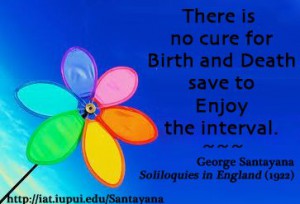
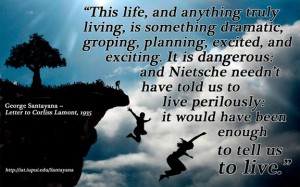
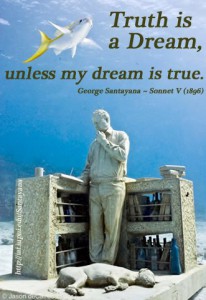
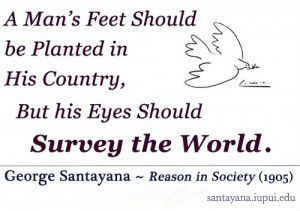
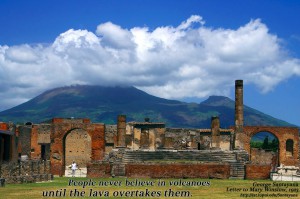
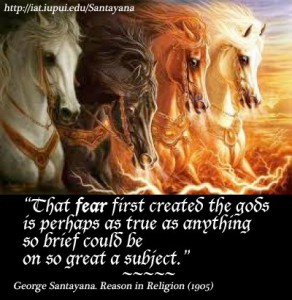
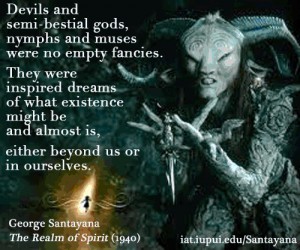
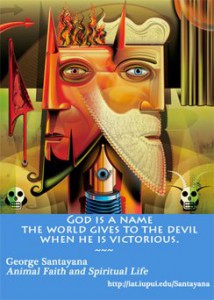
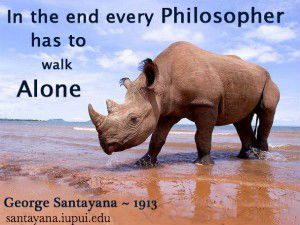
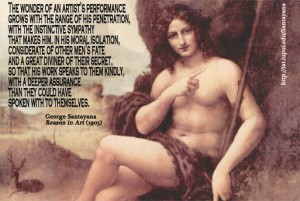

Leave a Reply
You must be logged in to post a comment.